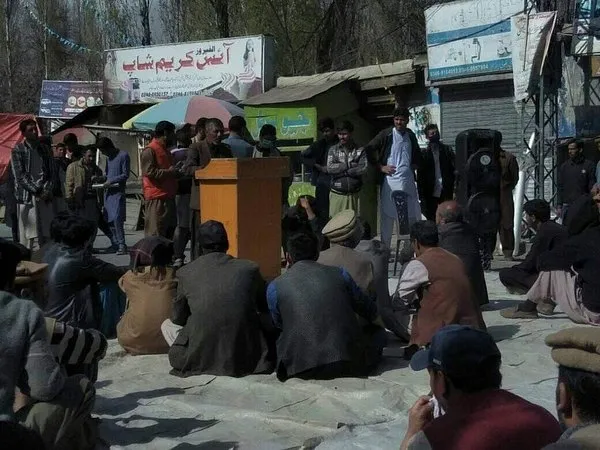The Jaffaria community chief Agha Rahat Hussein Al-Hussein on Monday expressed concern over the release of 13 youths who were given life imprisonment under the anti-terrorism act for a scuffle with security rangers in 2005.
Anjuman-e-Imamiya also protested over the issue as the current Gilgit-Baltistan government had promised their release in two months but so far no action has been taken in this regard, reported local media.
Women and Children from the Jaffaria community continued protests for the sixth day and Shia leaders have warned that if this issue was not resolved and 13 men were not released there would be protests everywhere.
The Khalid Khurshid Government should take this matter seriously as normal public and businesses will be severely hit if protests continues further, reported the local media.
Further talks about Gilgit-Baltistan’s constitutional status and rights were demanded by Jamat-e-Islami Pakistan vice president and Milli Yakjehti Council Sec-Gen Liaquat Baloch.
He said that the party in Gilgit-Baltistan will continue the struggle for constitutional status along with the rights of the people of Gilgit-Baltistan.
Pakistani authorities have finalised a law (26th Constitutional Amendment Bill), to award provisional provincial status to strategically located Gilgit-Baltistan.
Gilgit-Baltistan is an autonomous region now and after the bill is passed, it will become the 5th province of the country.
Currently, Pakistan has four provinces namely Balochistan, Khyber Pakhtunkhwa, Punjab, and Sindh. Presently, it has been ruled mostly by executive orders. Until 2009, the region was simply called Northern Areas.
It got its present name only with the Gilgit-Baltistan (Empowerment and Self-Governance) Order, 2009, which replaced the Northern Areas Legislative Council with the Legislative Assembly.
Gilgit-Baltistan is the northernmost territory administered by Pakistan. It is Pakistan’s only territorial frontier, and thus a land route, with China.
The Gilgit-Baltistan region is at the centre of the USD 65 billion China Pakistan Economic Corridor (CPEC) Infrastructure development plan.
The CPEC has made the region vital for both countries. The CPEC, which connects Gwadar Port in Pakistan’s Balochistan with China’s Xinjiang province, is the flagship project of China’s ambitious multi-billion-dollar Belt and Road Initiative (BRI).
Protests against land deal with China in Gilgit-Baltistan is the focal point.
Protests are going on (July 1) in Hussainabad, Hunza valley, Gilgit-Baltistan against the Pakistan Government’s decision for leasing out over 640 acres land of Hussainabad area to a Chinese Company without taking the people of Gilgit-Baltistan in confidence, reported local media.
Pakistan’s Government is leasing GB land to China to ease its mounting debt burden.
The protestors included prominent local leaders of GB like Baba Jan (Awami Workers Party Chairman). During the protest slogan “Hum Leke Rahenge Azadi” was also raised against the Pakistan Government by protesters, reported local media.
Chairman of Karakoram National Movement, Mumtaz Nagri also expressed fear that the isolated and neglected, Gilgit Baltistan could become a future battleground for the world powers to compete, reported Al Arabiya Post.
The northern-most part of Kashmir borders China and Nagri expressed fear that Pakistan may cede GB to China. Nagri is arousing people and has asked them “not to be scared of ISI and be prepared to go to jail,” Pakistani media reports have said.
Pakistan ceding GB that it illegally occupies would be a boon for China’s South Asian expansion. It has made use of territory in the region that Pakistan ceded earlier and would like GB since the Karakorum is right on the trail of the China Pakistan Economic Corridor (CPEC).
Any such move could earn Pakistan hefty lease money that could help tide over its current economic woes.

